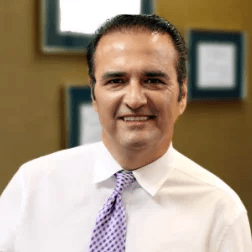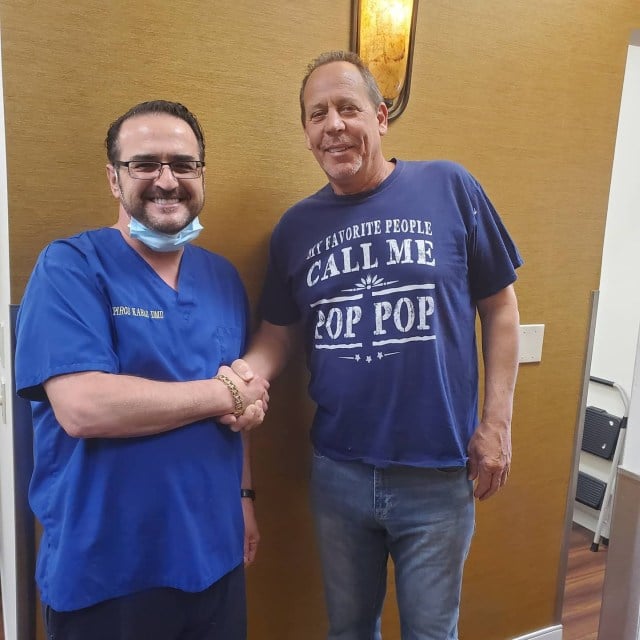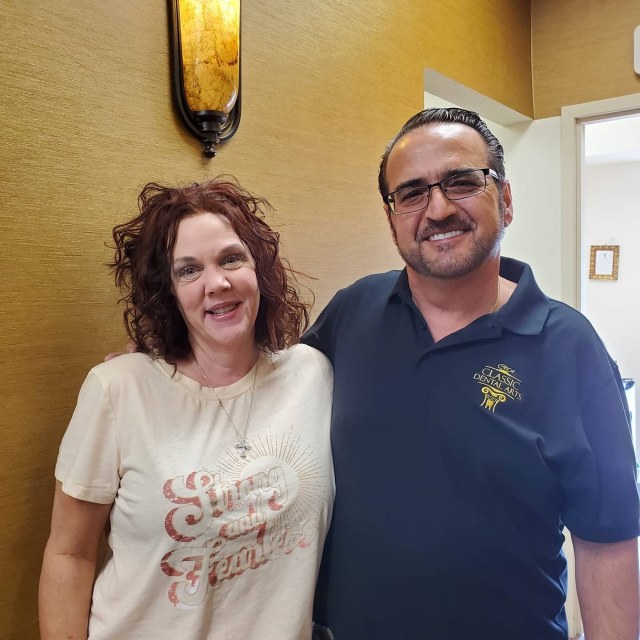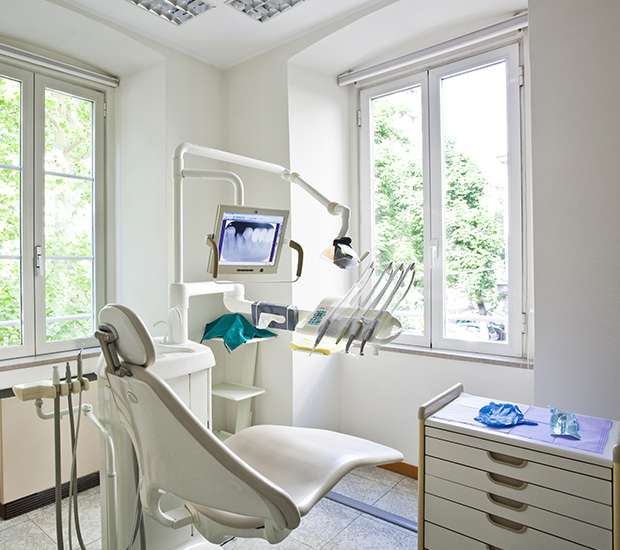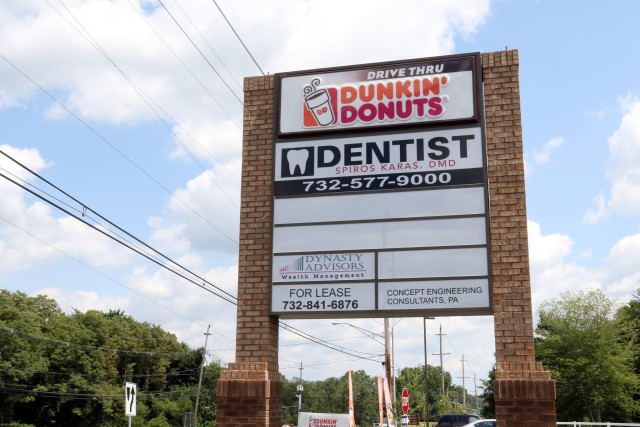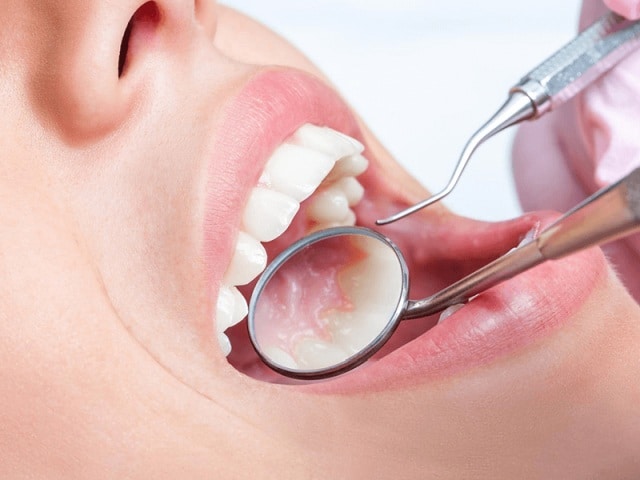We are proud of our office. Patients are the heart of our practice, so it makes sense that we would go out of the way to provide comfortable waiting and treatment areas complete with the types of amenities you would expect from our premier dental practice. Our office is filled with state of the art diagnostic and dental treatment technology to ensure accuracy and early detection of oral complications. We believe our patients deserve only the best, and our staff works hard to deliver a superior experience at every visit.
Dr. Karas is a highly skilled dentist dedicated to staying abreast of the latest advances in dentistry so that he can offer patients the very best in oral care. His utmost desire is to provide gentle and effective care to patients of every age and dental background. He believes that excellent oral health begins with education and prevention. His mission is to enlighten patients in the ways they can take greater control over their own dental health.
From the patient’s first consultation through follow-up, Dr. Karas will be there. He will not shuffle his patients off to someone with whom they are not familiar; instead, he believes in being accessible regardless of how complicated or lengthy a procedure becomes. Whether the patient needs a simple filling, root canal or complete dentures, he is there all the way through to ensure the best possible results and experience.
Committed to remaining aware of the latest advancements in oral health and dentistry, Dr. Karas is a member of the Monmouth County Dental Association, the New Jersey Dental Association, and the American Dental Association. During his last 30 years of practice in New Jersey, Dr. Karas has been active in the community of Manalapan.
Dental Implants :
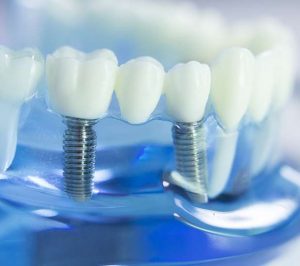 Dental implants can be an ideal solution to replacing damaged or missing teeth. They can restore not only the functionality of teeth but can provide a great new look as well. Dental implants are a standard cosmetic dental option offered at Classic Dental Arts.
Dental implants can be an ideal solution to replacing damaged or missing teeth. They can restore not only the functionality of teeth but can provide a great new look as well. Dental implants are a standard cosmetic dental option offered at Classic Dental Arts.
People tend to assume that the gap left behind after losing a permanent adult tooth can remain empty. The reality is that an exposed tooth socket faces the risk of infection, can cause teeth to shift out of alignment, and can cause other issues as well. With a dental implant, we can help patients avoid those oral health issues We have the tools and skills necessary to provide patients with a customized dental implant to meet their specific needs.
Dental implants can even help prevent facial structure from changing, providing the functionality needed to perform the same as before the original tooth was damaged. Supplementing them with a dental crown can also ensure that the dental implant looks perfectly natural along with your other teeth.
I need to replace two missing teeth next to each other. Can I just have one implant placed and attach it to one of my natural teeth and make a bridge?
Generally, this is not a good idea. We find that it is generally much better not to attach implants to teeth. We frequently attach implants to each other, which can improve strength and works well. So in a case like this, although it may be more expensive in the short term to place two implants instead of one, the long-term success is likely to be much better with the two implants.
I lost my upper back teeth on one side and have gone for years without doing anything about it. My sinuses always seem to bother me more on that side than on the side that I have back teeth. Could these problems be related to one another?
In a large majority of people who are missing their upper back teeth for a long period of time, is the increasing downward growth of the maxillary sinus. At birth, it is the size of a pea and progressively grows as the skull matures. This growth is at the expense of the surrounding bone. If you are considering replacing those upper back teeth with fixed teeth that stay in all the time, it may be necessary to perform a sinus elevation procedure to allow room for placement of dental implants into this area to support those teeth. This involves placement of bone and/or bone substitutes into an area which was previously occupied by the lower part of the maxillary sinus. Most importantly, this procedure increases the available bone use to place implants and restore the missing back teeth.
I've had dentures for several years and have lost a lot of jawbone. My lower dentures are floaters and I need help. Is there still hope for me?
In most cases, with the new options available today in the field of dental implants, some form of treatment is possible. We encourage people to get help as soon as possible if they are already having some problems with their current situation. These problems include excessive use of denture adhesives, chewing only soft food, unable to taste some foods, constant mouth sores, unhappy with the appearance of one's teeth and bite position (in some cases the nose and chin getting closer together). The sooner we correct the problems with dental implants, the more choices one has available for treatment. If you have any or all of the above symptoms, implants can very well be the answer for you.
I am missing all of my teeth and am now wearing a full upper and lower denture. I can no longer tolerate my lowers. Will I need an implant for every tooth I am replacing on the lower jaw?
It is not necessary to have an implant for every tooth that is being replaced. The number of implants necessary to provide support depends on the type of implants used and the type of teeth (removable vs. non- removable) that will be attached to the implants. A thorough oral exam and panoramic x-ray is all that is necessary in most cases, to determine which implant can be used and how many must be used. Sometimes additional X-rays or CT scans are used in more complicated cases.
I consulted a dentist several years ago about using implants to replace my lower denture and he told me that I did not have adequate bone available to place enough in-the-bone implants without danger of fracturing my now fragile jawbone. Are there any alternatives?
Because of the advances in the field of implantology, there are now more choices and techniques. It is rare for a person to not be able to receive an implant or a combination of implants. Today we have available many types of implants designed to accommodate multiple problems.
I had a root canal on a tooth that fractured and now it has to be removed. Can it be replaced with an implant or do I have to have a bridge or a partial?
Teeth that have root canals can fracture more easily than other teeth because they are weaker and somewhat dehydrated. They can sometimes be as brittle as glass. In the past, the best available treatment was to remove the tooth and file down the adjacent teeth to make a bridge - caps on the adjacent teeth with an attached "dummy" tooth between. Sometimes this still is the only way. However, in many cases an implant can replace the fractured tooth and we will not need to grind down a tooth to at all.
What are dental crowns?
A dental crown is a cap that surrounds the tooth. We typically use a crown to restore a damaged tooth, but they can also use it to improve the appearance of a smile. A crown can consist of three different materials, all-metal, ceramic-on-metal and all-ceramic. The location of the crown in the teeth will determine the best material to use. For example, front teeth need to have an all-ceramic crown, if possible, since it looks the most natural. Patients may often use ceramic-on-metal crowns since they look natural but have the durability that only metal can provide.
What are dental bridges?
A dental bridge is a way to replace a missing tooth. At Classic Dental Arts, we provide clients with dental bridges if they want to replace a tooth without wearing dentures or undergoing surgery. The new tooth is held in place by two crowns. It looks natural and consists of a ceramic or porcelain material to match the surrounding teeth. As a cosmetic dentist, Dr. Karas will make sure that the new tooth looks and feels amazing.
How long does a dental bridge last?
The duration of a dental bridge is different for everyone and is impacted by your daily habits. However, fixed dental bridges can last for 15 years or even longer. On the short end, they tend to last for five years. One thing to keep in mind is that the overall health of your mouth will influence the longevity of your bridge. Since the natural teeth with dental crowns determine the stability of the bridge, you must keep your natural teeth healthy. We recommend you do so by visiting our Manalapan Township, NJ dental office for a teeth cleaning and dental examination twice a year. We can remove built-up plaque to prevent decay and infections. If you develop any oral health problems, we will address them immediately. We will prevent the problems from spreading do not spread and your mouth can remain in excellent health.
What do I do if I damage my dentures?
You should never try to fix your dentures on your own since this can cause the damage to spread. However, there are certain things you can do at home before heading to the dentist, including:
Gather anything that has broken off. We encourage you to gather any piece of your dentures that has broken off, including any of the wiring.
Use dental wax. If the clasps have become slightly loose, they could be rubbing against your gums and irritating them. In this case, you may want to buy dental wax to place on the wire as a temporary barrier. Be sure to see a “dentist near me” who can treat you quickly.
Take them out. Soak your dentures or place them in a case for transportation to our office. Do not continue wearing damaged dentures.


